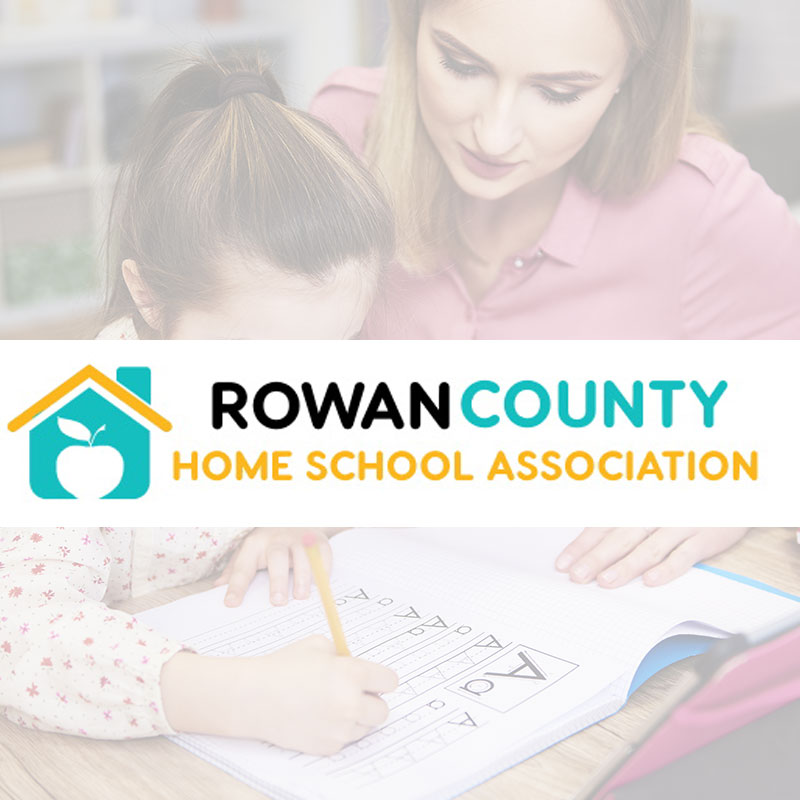Frequently Asked Questions about Homeschooling:
The simple answer to this question is No. Rowan County Homeschool Association is for legally registered and functioning homeschool families. If your children are enrolled in a public or private school program, even if they do their schoolwork at home, they are not legal homeschoolers. Homeschooling is different from school at home. While confusing, the law is clear on the distinction.
For more information, please refer to the N.C. Division of Non Public Education
In North Carolina, homeschooling is defined “as a non-public school consisting of the children of not more than two families or households, where the parents or legal guardians or members of either household determine the scope and sequence of the academic instruction, provide academic instruction, and determine additional sources of academic instruction”. To officially, legally, be considered a homeschool in NC, you must have an active Notice of Intent on file with the NC Division of Non Public Education and follow all the other legal requirements of the state (https://ncadmin.nc.gov/about-doa/divisions/division-non-public-education)The Notice of Intent must be filed for any family choosing to homeschool children of compulsory school age (6-year-olds turning 7 within the school year through age 18).
While homeschoolers in NC all have to follow the same rules, homeschooling itself takes almost as many forms as there are families doing it. Since every family is unique (number and ages of children, personalities, interests, goals, work schedules, etc.), each family will homeschool differently. It’s important to remember that there is no one “right” way to homeschool. Parents will discover their own teaching style and their children’s own learning style. What works for you might not be the same as what works for someone else. One of the biggest blessings of homeschooling is the freedom we have to do what is best for our family, and truly what is best for each individual child.
While a great deal of learning occurs at home, it is certainly not the only place where homeschooled children learn. Just as there is no such thing as a typical homeschooling family, it is difficult to describe a typical homeschool day.
Some families choose to mimic a traditional school routine. They work well with a structured daily schedule and their children thrive on traditional textbooks and work.
A more relaxed approach to homeschooling may include some time on their own at home (to read, play, build, draw, write, do a science experiment, work on math), some time with their parents (to get help with any of the above, to talk, to do work on a project together), and some time with others outside the home (in church, sports, music lessons, community groups, clubs, doing volunteer work, apprenticeships, Co-op, or classes).
Some families set aside a specific part of the day for academic work, others do not. Often this varies for each child and the family often adapts its schedule as
the children grow and their needs change. Most find that homeschooling becomes a part of daily life and enjoy incorporating “real world learning” as a regular addition to bookwork.
Many families like the flexibility homeschooling provides both parents and children. Children can learn about things they are interested in and at a time in their lives when they are ready to learn. No preconceived schedule forces them ahead or holds them back. Children learn about the ‘real world’ by being a part of it – no artificial settings are needed to ‘provide exposure.’ Children can receive a superior education attuned specifically to their own needs, learning styles, personalities, and interests – at far less cost than that of a private or public school. By being allowed to learn at their own pace, with a minimum of stress, homeschooled children have the time and space to internalize and use what they learn. Homeschooling families spend a tremendous amount of time together living, learning, and playing. They have the opportunity to develop a depth of understanding and a commitment to the family that is difficult to attain when family members spend their days going in separate directions. A nice side benefit to homeschooling is that vacations and other trips can be planned for times when the family is ready – and often when the crowds are smaller or the costs are lower.
Yes. Homeschooling is legal in all 50 states, although specific requirements vary.
North Carolina law defines a home school as a non-public school consisting of the children of not more than two families or households, where the parents or legal guardians or members of either household determine the scope and sequence of the academic instruction, provide academic instruction, and determine additional sources of academic instruction. General Statute 115C-563(a) as amended changes the definition of a home school to allow parents to hire tutors, let their children participate in group settings where they receive instruction (co-ops, 4-H classes, etc.) and be instructed by an expert that is not a part of the household in the established homeschool (apprenticeships, a homeschool doctor teaching biology, etc.) This will allow homeschool parents more freedom to choose what is best for the education of their children.
The North Carolina Division of Non-Public Education (DNPE) is authorized by state law to receive home school notices of intent to begin initial operation and to terminate operation, and to annually inspect the school’s student attendance and nationally standardized achievement test result records. Chief Administrators of home schools should anticipate receiving a request(s) to meet with a DNPE representative at a public location in close proximity to the home school while the home school is in operation
Homeschool Legal Requirements in North Carolina state: Parents/guardians residing in North Carolina and desiring, in lieu of conventional school attendance, to home school their children who are at least age 7 but not yet age 16 must:
- Hold at least a high school diploma or its equivalent;
- Send to DNPE a Notice of Intent to Operate a Home School. The notice must include the name and address of the school along with the name of the school’s owner and chief administrator;
- Elect to operate under either Part 1 or Part 2 of Article 39 of the North Carolina General Statutes as a religious or as a non-religious school;
- Operate the school “on a regular schedule, excluding reasonable holidays and vacations, during at least nine calendar months of the year”;
- Maintain at the school disease immunization and annual attendance records for each student;
- Have a nationally standardized achievement test administered annually to each student. The test must involve the subject areas of English grammar, reading, spelling, and mathematics. Records of the test results must be retained at the home school for at least one year and made available to DNPE when requested.
- Notify DNPE when the school is no longer in operation.
For more information visit the NC Division of Non Public Education website. https://ncadmin.nc.gov/about-doa/divisions/division-non-public-education
The best teacher for any child is someone who loves and cares about them and their particular way of learning – someone who has the time and the patience to provide one-on-one instruction.
Parents, thankfully, do not have to be an expert in every area to teach effectively. Most curriculums come complete with Teacher’s Guides to help you along the way. The internet offers endless possibilities for tutorials, lessons, full courses, full curriculums, and more. Answers to almost every question can be found with a little navigation of any search engine. It is perfectly fine to learn
along with your child. In fact, the ability for the whole family to learn together is another blessing of homeschooling.
The broader community is full of educational resources as well. Homeschooling families are fortunate to have the world as their classroom. The library, community colleges, tutors, co-ops, group classes, individual lessons, and more are all open to homeschoolers and easily accessible in our area. Many homeschooled high schoolers take advantage of dual enrollment at the local colleges. There are a couple of venues that offer science labs and lessons.
Finally, you will find that many families reach out to other homeschool parents, friends, acquaintances,and businesspeople in the community when those people can offer knowledge or skills that they lack. If you struggle to find the help you need on your own, our group is a great way to get connected to many of these opportunities and resources. We offer easy communication with the other members, so you can ask for help or advice whenever the need arises.
Homeschooling can be as expensive or as inexpensive as you make it. It depends on many factors, including what kinds of materials and resources you choose to use, how many children you will be homeschooling, and whether or not you will be giving up paid employment in order to homeschool your children.
Parents can easily spend a small fortune on all the wonderful learning materials and books available. On the other hand, a superior education can also be accomplished using free resources found through the internet, public library, interlibrary loan, and learning opportunities found in your community, such as museums and trips to interesting places.
Often, within the homeschooling community, parents also borrow and lend curriculum to each other. This is a great way to try out a curriculum you may be interested in, as well as a great opportunity to save money. Our group also offers an easy way for its members to buy and sell used curriculum. This is another easy way to cut the costs associated with homeschooling.
This is, perhaps, the most difficult question to answer – be prepared for your answer to change over time and be aware that some of the choices you may make will not always work out.
Before you purchase any curriculum or materials, be certain they fit with your own educational philosophy, and not any preconceived notions of “schooling” you may have. School curriculum and methodology have evolved to reflect the classroom environment of 20 to 30 children with one adult in charge. Curriculum developed by experts for this particular environment has been designed for ease of teaching, not necessarily for sparking the interest of the individual child.
Traditional curriculum publishers and other companies are aggressively marketing to the growing number of homeschooling families. There is a large market of educational supplies of all kinds. There are many well-tried homeschool curricula and study programs for every educational philosophy. It will take a little time on your part, but it is easy to research all the options online and find what you think will work best for your family.
In addition to curricula and textbooks, which usually serve only as a framework for education, homeschoolers go out into the community and the world at large for resources. Parks and recreation departments offer many classes and athletic opportunities. There are museums to visit, farms and factories, science fairs, and much more.
The public library is perhaps the greatest resource homeschoolers have. In addition to its huge selection of books, videos, and other materials, there are reading programs, lectures, and often classes.
The Internet is another tremendous resource for homeschooling families. today, there are many online school options, educational websites, online tutorials, and even full free courses available. In addition to all the benefits the Internet provides to homeschooling children, perhaps the most valuable service it provides is that of a support network for parents. Websites, email groups and social media dedicated to homeschooling serve as a gathering place for homeschooling parents to discuss teaching methods, share information, ask questions, compare notes about educational materials, and seek advice for difficulties they may be facing.
Public television and cable channels such as the History Channel, Discovery Channel and The Learning Channel provide a wonderful way to learn about a wide variety of subjects. Educational guides and supplemental materials are frequently available from the stations at low- or no-cost. YouTube channels like Khan Academy and Free School are also a great resource.
As a homeschooling family, you can utilize as many or as few of these options as you like. Some families like the ease and security of having a prepackaged curriculum, while others choose to be eclectic and pull from many different resources. As homeschoolers, you are in charge, so do not be afraid to take time to try many different things until you find the right fit for your family. This is an adventure, enjoy it!
Some school districts invite homeschooling families to use their curricula and textbooks, as well as may offer access to classes, extracurricular activities, or school libraries. It is advised to use caution when taking advantage of public or private school offerings. Be sure to review NC homeschool law so you do not inadvertently nullify your homeschool status. Also, be advised that umbrella schools, virtual public school, and the like are NOT homeschools and thus would make you ineligible for membership in our group.
Socialization is the process of an individual learning values, language, culture, behavior, and social skills that are needed to function well in their community. National studies find that homeschool children are better socialized and more engaged in their communities than students from public and private schools.
Homeschooled students regularly interact with other children of all ages, adults, and their same-age peers. In reality, they have more opportunities for socialization, and greater diversity in those opportunities, than their traditionally schooled peers. While there are cases of homeschool families that meet the “unsocialized homeschooler” stereotype, those families are rare. Homeschooling is a commitment to your children that reaches beyond just the curriculum and schoolwork. As a homeschool parent, it is your responsibility to get involved in the support group, extra lessons, community programs, volunteer opportunities, clubs, co-ops, and other activities that provide broader socialization opportunities for your children. In the same way that you have the freedom to choose curriculum and your schedule, you also have the freedom to choose which extra curricular activities work best for your family. In our area, there are more opportunities available than any one family could possibly do. Many of those are free or very low cost. Rowan County Homeschool Association’s annual Vendor Fair provides a time for you to get connected with many of those opportunities. We also are committed to helping you stay connected and up-to-date as new ones come up during the year.
Children who learn differently and/or have special needs make up a steadily increasing segment of the homeschool population. While traditional schools are set up to service the needs of the general public or the masses, home education can be tailored to personalize the learning process. There is more opportunity for creative learning, movement, flexible scheduling, breaks when needed, tailored individual programs/curriculum, personal attention, and more in the homeschool environment.
Yes, it does, and quite effectively. Homeschooling sets children up for college success. These students are generally self-motivated and self-disciplined. They know how to find information, manage their time, and take ownership of their education. These skills also lead to a generally smoother transition to college, a time when many students struggle with more educational freedom. Many colleges and universities now seek out homeschoolers and accept them at a high rate for these very reasons.
On the college-entrance Scholastic Achievement Test (SAT), homeschoolers score 67 points above the national average, and homeschoolers outperform all other students on the ACT (American College Testing). Further, 68 percent of U.S. universities now accept parent-prepared transcripts.
In fact, homeschoolers have a higher rate of attending college than any other group of children: 66.7% of homeschooled children, compared to 57.5% of traditional public school children.
Hundreds of colleges, universities (yes, even Harvard and Yale!) and vocational institutes all over the nation accept homeschooled students. They are thrilled with these intelligent, responsible, capable young people and many actively recruit them. Parents of high schoolers keep track of what their children complete during the high school years so a transcript can be created. Our group regularly offers support meetings to address this topic thoroughly. It is the responsibility of each individual homeschool to present a diploma to their graduate.
Furthermore, NC colleges offer dual enrollment opportunities for high school students. This allows the students to earn college credit while still in high school. The cost for these classes is minimal, usually just the cost of books and supplies. As a homeschooler, dual enrollment provides the opportunity for many to graduate high school with a high school diploma and an Associates Degree at the same time.
Keep in mind that for many teens who already know where they are headed, apprenticeship opportunities and other forms of ‘on-the-job’ training can be a faster and more satisfying entry into their adult lives. And remember, the decision to forgo college is never irrevocable. Most institutions highly value older students, since they are usually enthusiastic and focused on learning.
In our area, the Greater Cabarrus Athletic Association (http://www.gcaastallions.com/) offers sport programs such as football, basketball, volleyball, baseball, track, and cheer. Some private schools allow home school students to participate in their sports programs. There are also community track/running programs, homeschool PE classes, rec leagues, and more. Homeschooling allows for greater flexibility of schedules so your child can explore the various options and participate with ease.
Again, while homeschooling requires time and devotion, the schooling schedule is up to you. Some parents who work during the day homeschool at night. Busy single parents, in fact, are homeschooling their children, as are fathers, aunts and uncles. The best part of homeschooling is it is extremely flexible to meet your individual needs.






